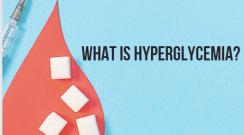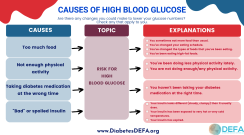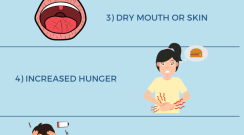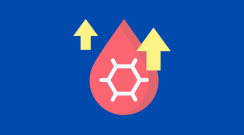Hyperglycemia or high blood glucose (sugar) means your blood glucose is over 180 mg/dl (10.0 mmol/L). Risk of high blood glucose goes up if you take too little diabetes medicine, eat more than usual or are less active. If your body does not make enough insulin or is not able to use the insulin you make well, too much glucose stays in your blood. Talk to your healthcare team about how you can lower and prevent high glucose.
- Posted: 11 January 2023
Hyperglycemia, or high blood glucose (sugar), is when your blood glucose is over 180 mg/dl or 10.0 mmol/L. This short video talks about the early signs you should look out for. Knowing these signs helps you know how often to check and treat your blood glucose to prevent problems.
Topics: Hyperglycemia
- Posted: 02 June 2023
Hyperglycemia, or high blood glucose (sugar), can happen when you have diabetes. Learn some causes of high blood glucose and ways you can lower your risk.
Topics: Hyperglycemia
- Posted: 02 June 2023
Signs that you have hyperglycemia, or high blood glucose (sugar) depend on how high your blood glucose is and how long it has been high. Learn the signs to look for so that you can take action.
Topics: Hyperglycemia
- Posted: 24 January 2023
When you learn to treat high blood glucose (sugar), you will lower your risk of diabetes problems in your eyes, kidneys, and feet. Work with your healthcare team to lower your blood glucose to goal.
Topics: Hyperglycemia
- Posted: 02 June 2023
Hyperglycemia or high blood glucose (sugar), even for a short time, can cause health problems if you don’t treat it. Here is why you should treat high blood glucose right away.
Topics: Hyperglycemia
- Posted: 02 June 2023
Hyperglycemia or high blood glucose (sugar) can cause health problems if you don’t lower your glucose. Here are some of the problems you can have if you don’t treat high blood glucose and reach your glucose goals.
Topics: Hyperglycemia
- Posted: 02 June 2023
Hyperglycemia or high blood glucose (sugar) means that there is too much glucose (sugar) in your blood. Here are some of the causes of high blood glucose.
Topics: Hyperglycemia
- Posted: 11 June 2024
Watch this video to learn about high blood glucose and how to treat it. Getting your blood glucose at or near goal as often as you can will lower your risk of diabetes problems.









